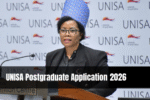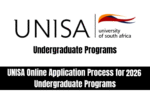UNISA Prescribed Student Fees: Honours & 4th Year. Navigating the financial aspects of higher education can be challenging. At the University of South Africa (UNISA), understanding the detailed fee structure for honours and 4th-year courses is crucial for students to manage their finances effectively. Below, you’ll find a detailed breakdown of the costs associated with these advanced modules, along with important payment deadlines to ensure smooth registration and academic progress.
Initial Payment and Registration Details
To secure enrollment in any module or paper at UNISA, students are required to make a minimum payment before the registration deadline. This upfront payment is crucial as it confirms the student’s commitment and allows the university to process the registration. The remaining balance must then be cleared by specified due dates to maintain enrollment.
Important Note: All payments must be channeled into UNISA’s official bank account, and students must use the correct reference number to ensure the university processes these payments accurately. Students sponsored by employers or external bodies need to provide a confirmation letter from their sponsors. UNISA will issue a quotation to the sponsor, but the registration activates only upon the receipt of the minimum due payment.
UNISA Prescribed Student Fees: Honours & 4th Year
The tables below provide a detailed look at the fees for various disciplines within honours and 4th-year modules. These are segmented by subject group and include specific payment amounts due at registration, as well as subsequent deadlines.
Table 1: Fees for Arts, Law, and Social Sciences
| Subject Group | Duration | Total Fee | Minimum Due at Registration | Due by 31 March | Due by 15 May | Due by 15 August |
|---|---|---|---|---|---|---|
| Education, Law, etc. | Half module (Year) | R1,465 | R485 | – | R490 | R490 |
| Module (Semester 1) | R2,930 | R965 | R1,965 | – | – | |
| Module (Semester 2) | R2,930 | R965 | – | – | R1,965 | |
| Year module | R5,760 | R1,900 | R1,930 | R1,930 | – |
Table 2: Fees for Economics, IT, and Management
| Subject Group | Duration | Total Fee | Minimum Due at Registration | Due by 31 March | Due by 15 May | Due by 15 August |
|---|---|---|---|---|---|---|
| Economics and Management | Half module (Year) | R1,395 | R460 | – | R467 | R468 |
| Module (Semester 1) | R2,805 | R925 | R1,880 | – | – | |
| Module (Semester 2) | R2,805 | R925 | – | – | R1,880 | |
| Year module | R5,465 | R1,805 | R1,830 | R1,830 | – |
Table 3: Fees for Engineering and Sciences
| Subject Group | Duration | Total Fee | Minimum Due at Registration | Due by 31 March | Due by 15 May | Due by 15 August |
|---|---|---|---|---|---|---|
| Engineering, Sciences, etc. | Half module (Year) | R1,395 | R460 | – | R467 | R468 |
| Module (Semester 1) | R2,805 | R925 | R1,880 | – | – | |
| Module (Semester 2) | R2,805 | R925 | – | – | R1,880 | |
| Year module | R5,465 | R1,805 | R1,830 | R1,830 | – |
Additional Costs: Prescribed Books and Study Materials
Students must also account for the cost of prescribed books and additional study materials necessary for their courses. To facilitate budgeting, UNISA allows students to request an advance list of required books via email. The costs for these materials are variable and should be confirmed with official booksellers.
Example of Additional Costs
- ADB1501 Module: R162.00
- CRW2601 Module: R90.00
Financial Management Tips for UNISA Students
- Plan Early: Request the list of prescribed books and detailed fee schedules ahead of registration.
- Follow Official Procedures: Ensure all payments are made using the official bank details and reference numbers provided by UNISA.
- Communicate with Sponsors: If your fees are sponsored, keep in constant communication with your sponsor to ensure timely payments.
- Budget for Extras: Set aside funds for additional costs such as books and study materials.
READ ALSO
- Unisa Online Application 2025-2026
- UNISA Application Status Check
- 1 Year Diploma Courses at UNISA
- UNISA Application Fee Banking Details
Conclusion
Understanding and adhering to UNISA’s fee structure is crucial for financial planning and academic success. Timely payments and proper budgeting for additional costs help students avoid registration issues and focus fully on achieving their educational objectives without financial stress.










